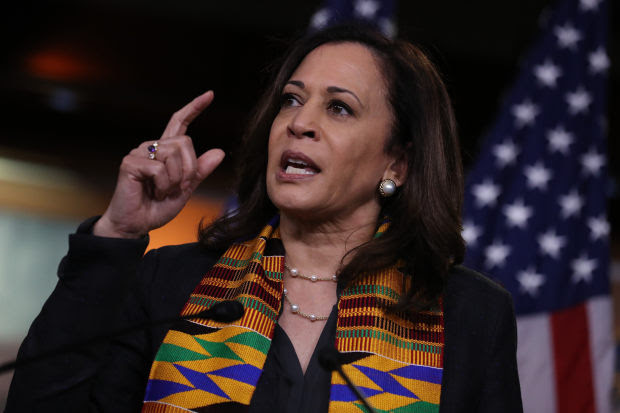Senator is emerging as a leading Democratic voice on race and overhauling the criminal justice system

PHOTO: CHIP SOMODEVILLA/GETTY IMAGES
By Tarini Parti
June 15, 2020
As a presidential candidate, Sen. Kamala Harris repeatedly tried to explain her record on criminal justice and told voters stories about her family’s history of activism in the civil-rights movement.
But Ms. Harris was met with skepticism, especially from progressives who wrote her off because of her career in law enforcement, which helped to lead the California senator to drop out of the race much earlier than expected.
Now Ms. Harris is viewed by party leaders as a top potential choice as former Vice President Joe Biden’s running mate. She is using her law-enforcement experience—seen as a liability during much of the presidential primary by her own advisers—and her family’s civil rights background to become a leading Democratic voice on race and overhauling the criminal justice system in the aftermath of George Floyd’s killing while in police custody.
In recent weeks, Ms. Harris, the former attorney general of California and the former San Francisco district attorney, has twice marched and chanted with protesters outside the White House, blasted on the Senate floor a Republican effort to make amendments to an anti-lynching bill, become a fixture on cable and network news shows to talk about the killing of black men and women by police, and helped craft legislation to overhaul policing.
Ms. Harris’s role in Democrats’ response to Mr. Floyd’s killing comes as Mr. Biden is under renewed pressure to pick a black woman to be his running mate. A group of black activists and party leaders pushed Mr. Biden in a recent call to pick a woman of color, according to people familiar with the call.
Major donors are making that case to his campaign, with some specifically backing Ms. Harris, who they believe has more experience than others under consideration, a built-in base of supporters and the advantage of already being publicly vetted.
Ms. Harris “is qualified, the best partner to defeat Trump and the ideal leader to take on the economic and racial injustices that are dividing Americans,” said Alex Heckler, a Miami-based donor and deputy national finance chairman of the Democratic National Committee.
With protests over police brutality spreading across the nation, Ms. Harris, who didn’t regularly emphasize her law-enforcement career until the final weeks of her presidential campaign, has been putting it front and center.
“I say this as a former prosecutor: We need a national use-of-force standard,” said Ms. Harris, the daughter of Indian and Jamaican immigrants, when Democrats unveiled details of their policing bill.
As she pitches the bill in interviews, she has used her experience to explain details including the need for independent investigations of police misconduct.
“She has really been a clarifying voice for why the legislation is needed,” said Leah Daughtry, a former Democratic Party official and longtime strategist. “I think she’s helped herself quite a bit in the eyes of people who might have been skeptics, but it also points to her experience. The job as prosecutor is to put the bad guys in jail, but there is so much more you can do in the portfolio…this is a way for her to talk about that.”
During the presidential primary, some activists criticized her for not doing enough to end mass incarceration and pointed to policies she championed in California, including an effort to end truancy that disproportionately affected parents of color. While some of those activists have said they have been impressed by her push for change in the aftermath of Mr. Floyd’s killing, not everyone is convinced.
“She just has a record that doesn’t sit well in my soul,” said Helene Fisher, a 50-year-old museum educator who showed her support for the Black Lives Matter movement near the White House, where protesters have been gathering for about two weeks. “And it seems very punitive, as opposed to reform-oriented.”
Ms. Harris has said she went into law enforcement—shocking her family with her career choice—to change the system from the inside, but acknowledges she could have done more.
Since dropping out of the presidential race, Ms. Harris refocused her legislative efforts on black and brown communities, staying in touch with activists on the disproportional impact the coronavirus pandemic was having on minorities and pushing for legislation that addressed those concerns. With the killings this year of Ahmaud Arbery, Breonna Taylor and most recently Mr. Floyd, her conversations shifted toward overhauling law enforcement, according to people familiar with the meetings.
Although Ms. Harris isn’t publicly advocating for herself, as some other contenders are, she has become a top surrogate for Mr. Biden, helping him raise $3.5 million at a recent fundraiser. “She’s been a fighter and a principled leader, and I know because I’ve seen her up close, and I’ve seen her in the trenches,” Mr. Biden said of her at the event, bringing up Ms. Harris’s relationship with his late son, Beau, who got to know Ms. Harris while he served as attorney general of Delaware and she had that role in California. He died in 2015 after suffering from brain cancer.
Ms. Harris’s husband, Doug Emhoff, a lawyer, is also helping raise money for Mr. Biden, according to people familiar with the situation, and she has held virtual events connecting top Senate Democratic candidates to her major donors.
Ms. Harris has pared down her brain trust to a small group of advisers, which includes Julie Chavez Rodriguez, a former Obama administration aide who recently joined Mr. Biden’s effort. Ms. Harris’s own campaign suffered from having too many power centers and muddled messaging, according to former aides.
Ms. Harris’s supporters argue that her criminal justice record and message have remained the same. But with the competitive primary now over and the current political debate focused on race and policing, they say she is able to talk more openly about her record without being criticized.
“When candidates are vying for votes, we always want folks to examine their records,” said Glynda Carr, co-founder of Higher Heights, a black women’s group that endorsed Ms. Harris during the primaries.
“Unfairly or not, it’s our process of being informed voters,” Ms. Carr added. “But when you look at her complete body of work and then you insert her experience as a black woman in America, she is uniquely positioned.”
—Ken Thomas contributed to this article.
Write to Tarini Parti at Tarini.Parti@wsj.com


